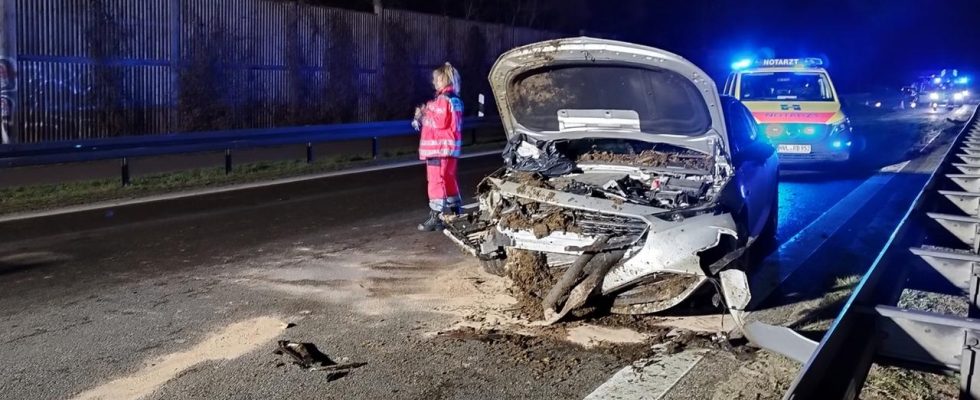In Brandenburg, several people were injured by piles of dung on the road. But unlike the “Last Generation,” hardly anyone is upset about this farmers’ protest.
It was still dark when Bianca Reim from Potsdam drove on Bundesstraße 5 in Brandenburg that day. Only at the last moment does she see the pile of dung on the road and swerve. Your car hits the obstacle with its bumper.
Others aren’t so lucky. Two more cars collide directly. The hoods look as destroyed as if they had been in a serious traffic accident and airbags are deployed. Five people are injured in the action and are taken to hospital.
Protesting farmers dumped the steaming heaps onto the street as a sign of their protest. According to the police, it is a “dangerous interference with road traffic.” The action was not registered.
Comparison with debate about “climate glue”
Many people online react with incomprehension. “Do the farmers no longer have a conscience about what they are doing to other people?” comments one user, for example RBB24.
A comparison is quickly made to protest actions of the “Last Generation”: “It’s interesting, young people who stick to the streets are, in the opinion of the conservatives (CDU/CSU), ‘terrorists’ and house searches are carried out,” writes Mattias from Heidesee .
Criticism comes from the President of the Brandenburg State Farmers’ Association, Henrik Wendorf: “What has happened now must not happen. Limits have been exceeded here.”
Brandenburg’s Prime Minister Dietmar Woidke also criticized the state farmers’ day for saying that a red line had been crossed. “You can protest and demonstrate against decisions,” said the SPD politician. “But that is no justification for risking other people’s lives.”
“Climate RAF” and “terrorists”
But overall the criticism is muted. There is no nationwide outcry, no demand for harsher punishments. Protest researcher Dieter Rucht has an explanation for this. “Farmers are seen as down-to-earth, wait-and-see and calm,” he says. If this group took to the streets, many would have the impression that they must have good reasons. So the protest is virtually legitimate.
With the “last generation,” people see things differently, says Rucht. “When young people who are perhaps in training, who are studying, who are not yet firmly established in life, take to the streets, the protest is seen as unjustified and excessive.” This results in different perception and appreciation. The status of the group determines whether protest is viewed as permissible by society.
This outrages many people, especially online: “Imagine the last generation had dared to endanger other road users in such a way, life imprisonment would have been demanded,” comments one user.
In fact, several federal politicians had described the activists as “terrorists” in reference to the “Last Generation” and their protests. Chancellor Olaf Scholz (SPD) called them “crazy”. The CSU politician Alexander Dobrindt spoke of a “climate RAF” and called for “minimum prison sentences and preventive detention”.
Konstantin Kuhle from the FDP even wanted to have the climate activists monitored by the Federal Office for the Protection of the Constitution. CDU General Secretary Carsten Linnemann called for “prison sentences of several months, perhaps even a few years.”
The dung heap blockade in Brandenburg, however, remains uncommented at the federal level. In the ARD show Hard but fair CDU General Secretary Carsten Linnemann is asked whether farmers should now be punished more harshly.
In the wake of the climate protests last year, the CDU submitted a motion in the federal government to punish road blockers more harshly. “It was about the climate stickers, it was obvious. And I think that you can’t compare the farmers with the climate stickers,” said Linnemann.
Nevertheless, the demand for harsher punishments applies to both protest groups, said Linnemann. If someone has committed a crime, he doesn’t distinguish who did it.
The farmers who dumped the piles of manure onto the road in Brandenburg publicly apologized after the action.

